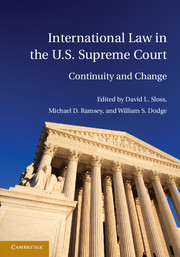Book contents
- Frontmatter
- Contents
- List of Contributors
- Table of Cases
- Acknowledgments
- Introduction
- PART I FROM THE FOUNDING TO THE CIVIL WAR
- 1 International Law in the Supreme Court to 1860
- PART II FROM THE CIVIL WAR TO THE TURN OF THE CENTURY
- PART III FROM THE TURN OF THE CENTURY TO WORLD WAR II
- PART IV FROM WORLD WAR II TO THE NEW MILLENNIUM
- PART V INTERNATIONAL LAW IN THE U.S. SUPREME COURT IN THE TWENTY-FIRST CENTURY
- V.A TREATIES AFTER 2000
- V.B CUSTOMARY INTERNATIONAL LAW AFTER 2000
- V.C INTERNATIONAL LAW AND CONSTITUTIONAL INTERPRETATION AFTER 2000
- V.D INTERNATIONAL LAW AND STATUTORY INTERPRETATION AFTER 2000
- V.E INTERNATIONAL LAW AND THE WAR ON TERROR
- VI CONCLUSION
- Index
- References
1 - International Law in the Supreme Court to 1860
Published online by Cambridge University Press: 05 July 2011
- Frontmatter
- Contents
- List of Contributors
- Table of Cases
- Acknowledgments
- Introduction
- PART I FROM THE FOUNDING TO THE CIVIL WAR
- 1 International Law in the Supreme Court to 1860
- PART II FROM THE CIVIL WAR TO THE TURN OF THE CENTURY
- PART III FROM THE TURN OF THE CENTURY TO WORLD WAR II
- PART IV FROM WORLD WAR II TO THE NEW MILLENNIUM
- PART V INTERNATIONAL LAW IN THE U.S. SUPREME COURT IN THE TWENTY-FIRST CENTURY
- V.A TREATIES AFTER 2000
- V.B CUSTOMARY INTERNATIONAL LAW AFTER 2000
- V.C INTERNATIONAL LAW AND CONSTITUTIONAL INTERPRETATION AFTER 2000
- V.D INTERNATIONAL LAW AND STATUTORY INTERPRETATION AFTER 2000
- V.E INTERNATIONAL LAW AND THE WAR ON TERROR
- VI CONCLUSION
- Index
- References
Summary
The United States and the Law of Nations, 1776–1789
The Declaration of Independence in 1776 marked the birth of the United States as a nation and as a subject of the law of nations. As Chief Justice John Jay later wrote, “[T]he United States had, by taking a place among the nations of the earth, become amenable to the laws of nations; and it was their interest as well as their duty to provide, that those laws should be respected and obeyed.” Complying with the law of nations was important for a small, weak country trying to avoid trouble, but the law of nations was also a tool that the United States would use to protect its trade and commercial interests. National honor was at stake as well, an idea the Revolutionary generation took quite seriously. Interest and duty – as Jay put it – compelled the Founders to pay close attention to the law of nations.
Eighteenth-Century Sources of International Obligations
For eighteenth-century Americans, international legal obligations fell broadly into two categories: treaties and the unwritten law of nations. Formal written treaties formed an important part of European international relations at the time, as a way European nations arranged alliances, settled disputes, and established economic relations. American independence itself rested heavily on treaties. Two 1778 treaties with France cemented an alliance that led to French assistance against Britain.
- Type
- Chapter
- Information
- International Law in the U.S. Supreme Court , pp. 7 - 52Publisher: Cambridge University PressPrint publication year: 2011
References
- 4
- Cited by



